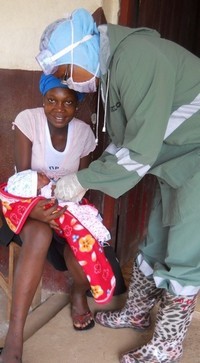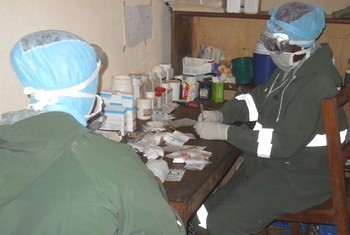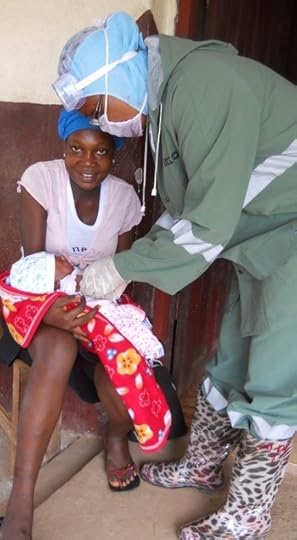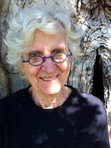WISHING YOU COULD DO SOMETHING…

For me, Ebola has come home.
A sister in the spirit and in the work of AWA, Bisi Ideraabdullah, is at risk, at personal peril, in the fight agains Ebola. She founded a clinic in Liberia 21 years ago. It now serves apps. 17,000 women and children each year. Now two of its staff have fallen to Ebola. If you can, please join me in reading the material below, and giving what you can.
My friend and colleague Elise Rymer wrote the pieces below and has allowed me to share them with you:

____________________________
Ebola in Liberia – a way to help through a small, highly effective, NY-based non-profit
Click here to jump right to “How to Help”.
There is a pain—so utter—
It swallows substance up—
Then covers the Abyss with Trance—
So Memory can step
Around—across—upon it—
……………….. – Emily Dickinson
Several days ago I sent a copy of Dickinson’s poem to my friend Bisi Ideraabdullah. From the first time I met Bisi, I knew she was a remarkable woman and was the founder and executive director of Imani House in Liberia and in an impoverished area in Brooklyn.
Almost a decade ago, Bisi and I got acquainted during a weekend writing retreat focusing on race. Pat Schneider, life-changing writing teacher and founder of Amherst Writers & Artists, had invited four African-American women and three other Anglo-American women to join her. That arduous yet exhilarating weekend laid the foundation for the friendship that has been deepening between Bisi and me over our years of serving on the Amherst Writers & Artists Board.
 This July, after watching the PBS Newshour and one more report on Ebola in West Africa, I was wracking my brain as I sat, like many of us, feeling utterly helpless in the face of “pain so utter” – a scourge, a terror, a disease killing people of all ages, a disease that makes touching, helping, nursing the sick easily lethal. How to help? how to help? The light bulb finally went on in my brain –- well, duh, call Bisi. She’ll be able to tell those of us who want to help what we can do.
This July, after watching the PBS Newshour and one more report on Ebola in West Africa, I was wracking my brain as I sat, like many of us, feeling utterly helpless in the face of “pain so utter” – a scourge, a terror, a disease killing people of all ages, a disease that makes touching, helping, nursing the sick easily lethal. How to help? how to help? The light bulb finally went on in my brain –- well, duh, call Bisi. She’ll be able to tell those of us who want to help what we can do.
Having emigrated from Brooklyn to Liberia in 1985 with her husband and family of four, Bisi early on established the first Imani House. “Never a stranger to helping others,” she saw that literacy and other outreach programs could ease some of the desperate conditions of those living nearby. “Raised by her grandmother as a small child, she witnessed philanthropy as early as she could remember. She had always been aware of the power to change people’s lives. “I was never taught that one person couldn’t change things. My grandmother was the kindest person. I grew up with her as a small child and watched her,’ she said. ‘We don’t realize how much our children are watching, but the way they learn to walk and talk is the same way they learn to care.’”*
Not long after the Ideraabdullahs had settled in Monrovia (Liberia’s capital), civil war was instigated by Charles Taylor. This war became one of Africa’s bloodiest. Bisi and her husband sent their children back to Brooklyn to be safe with family members.
 Being firsthand witnesses to the chaos and suffering brought about by the war and feeling a need to help, Bisi and her husband began volunteering, caring for the wounded and sick at a hospital near their home. Neither had a background in health or had ever been through a civil war; certainly they were not prepared for what they witnessed: severe hunger, desolation, atrocities, suffering and death. Large numbers of children were brought to the hospital for treatment or because they had nowhere else to go. Many children were never claimed by family or relatives, so Bisi began a makeshift orphanage in her own home. All the while she managed to continue and expand the work of Imani House, and eventually a clinic was built in Jahtondo Town ten miles north of the capital city of Monrovia.
Being firsthand witnesses to the chaos and suffering brought about by the war and feeling a need to help, Bisi and her husband began volunteering, caring for the wounded and sick at a hospital near their home. Neither had a background in health or had ever been through a civil war; certainly they were not prepared for what they witnessed: severe hunger, desolation, atrocities, suffering and death. Large numbers of children were brought to the hospital for treatment or because they had nowhere else to go. Many children were never claimed by family or relatives, so Bisi began a makeshift orphanage in her own home. All the while she managed to continue and expand the work of Imani House, and eventually a clinic was built in Jahtondo Town ten miles north of the capital city of Monrovia.
Despite her and her husband’s move back to Brooklyn in 1996 due to the civil war, Bisi, with the help of her husband and long-time staff members, has continued relentlessly to pursue and expand the work of Imani House in Liberia as well as in Brooklyn.
When asked how she’s done and is continuing to do so many remarkable things for others over decades, her answer not infrequently has been, “It helps to have post traumatic stress disorder because you do not stop working. You do not want to sleep, because you dream about the things you saw… You just want to work.”*
When I e-mailed her, she responded immediately. She let me know how I could help, yet not once did she ask for a contribution. I finally brought it up, and yes, she said, funding was becoming yet another crisis. Contributions of any size would help, especially with morale. Those on the front lines need to know others care. Here, I thought, was an open avenue to a highly efficient, established organization where I could fully trust the leadership, where even small contributions would go a long way, including keeping hope vitalized in the face of a terrifying disease.
If you’re interested in learning more, the place to start is with the Imani House website. It has updates on the clinic and its work with Ebola patients and also staff efforts to educate people about the disease, including protective measures against being infected.
If you would like to contribute online, information is on the Imani House website. Or you can write a check made out to Imani House and send it to the following address:
Imani House, Inc.
c/o Mrs. Bisi Ideraabdullah
76-A Fifth Avenue
Brooklyn, NY 11217
(Phone: 718 638 2059 Fax: 718 789 1094)
Imani House is a 501(c)3.
__________________________________________________
From Global Giving–
Imani House International (IHI) Clinic is 21 years old. It has lost two of its staff but remains open in the face of the contagious Ebola Virus scurge. Located on the outskirts of Monrovia Liberia, each year the Clinic serves appx. 17,000 women and children.IHI is asking others to join them in this fight against this unseen enemy Ebola that is destroying the lives and fragile infrastructures of W. Africa. Contributions are sought to help the organization keep the clinic open, and to purchase much needed protective supplies for the staff and community, acquire an ambulance, complete the renovation of a small building that will serve as a triage and isolation space for suspected cases of Ebola, to expand the community education and Ebola awareness campaign, and to allow IHI to serve as a public information bridge for other health workers & the Ministry of Health. Donate at http://www.globalgiving.org/projects/ebola-outbreak-help-us-protect-liberians/
$60 – will buy a case of 300 safety masks,
$25 will buy one Hazmat suit for a staff person
$10 will purchase 6 gallons of clorox for clinic daily disinfectingContact Bisi Ideraabdullah at 347 210 8026 www.imanihouse.org



